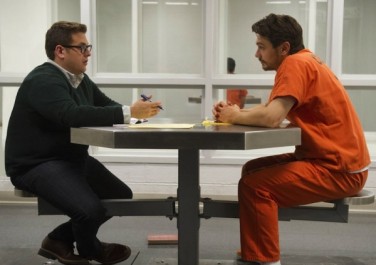If Mike Finkel had worked for Rolling Stone magazine and not The New York Times, he might never have met accused serial killer Christian Longo.
True Story recalls what happened when a disgraced reporter learned a man used his name after allegedly killing his wife and three children. Can said reporter write the story of the century about a potential monster? Is Longo innocent despite the evidence against him?
The bigger question is . . . will audiences enjoy a mystery with an outcome already spoiled by the news and some reality TV shows?
True Story sizzles if you don’t know the final verdict. It’s an engrossing tale even if you do, complete with a moral lesson absent on screen today. And, yes, there’s a lesson or three about journalism recognizable to those who see the media as one big confirmation bias machine.
The trouble begins for Finkel, played by Jonah Hill, when his cover story on child slavery in Africa crumbles. He’s an ace reporter who failed to check his facts, and it costs him his job. It’s almost humorous to see his outraged editors slam his mistakes, given how many errors go unchecked at the Old Gray Lady of late.
Finkel barely has time to mourn his career meltdown when he learns that Longo (James Franco) used his name while traipsing through Mexico after the death of his wife and children. But why did he choose Finkel’s name?
The two men meet. Longo wants to give Finkel his story—exclusively. Finkel sees it as the perfect second chance.
What follows touches on themes of guilt, innocence, and just how far someone will go to expose the truth. But True Story also offers meatier themes, one of which cuts against the Hollywood grain without apology.
The obvious through line here is journalism standards, or the lack thereof. Finkel abandoned his craft to tell a snazzier story, period. It costs him, but we’re not sure whether he’s learned his lesson. It’s like Rolling Stone’s Sabrina Rudin Erdely pursuing another college rape story without remembering the mistakes she made the last time.
Finkel’s story, however, is more complex than that. He bonds with Longo during their extended interviews. He quietly beams that he has a fan in the accused killer. Journalists aren’t rock stars, so when someone singles out their work it’s a point of pride, no doubt.
Finkel’s wife (Felicity Jones) isn’t sure what to make of her husband’s new “friend.” Nor are we. Jones, so compelling in The Theory of Everything, isn’t given much to do here, other than to pat her beau on the shoulder and frown when she fears he’s abandoning his principles yet again. It’s the weakest link in an otherwise sturdy production, and one wonders whether the home video version might include sequences fleshing out their bond.
Hill isn’t a revelation here. He’s already proven worthy of dramatic fare, and he buries his comic impulses to bring Finkel to the screen. He’s best at capturing the writer’s indignation over his fate, the kind of blind allegiance to his abilities that many will recognize from reporters who routinely dismiss accusations of bias. It’s subtle and a bit frightening, given the real-world implications.
Franco’s work is more compelling. It’s easy for such a handsome star to win us over, but it’s how he connects with Finkel that impresses. He also keeps audiences guessing, both about the crime he’s allegedly committed and his true intentions. It’s a quietly excellent performance. Had the film arrived during Oscar season, there could be a murmur or two for Best Supporting Actor honors.
As is, the film’s release date will likely curtail such chatter.
Director Rupert Goold is stuck photographing prison cell interviews that make up a large part of the film’s running time. He shrewdly doesn’t over-direct these sequences. Instead, he varies the close-ups and angles in gentle ways, enhancing the performances without drawing attention to them.
Spoiler Ahead …
The film’s big surprise carries a moral weight missing from many films today. It conveys a sense of outrage that will appeal to traditional moviegoers exhausted at how often they are asked to consider the root of criminal activity instead of its effects, an attitude that tends to undermine the attribution of responsibility.
The theme rises up twice, once during a scene that smacks of convenience but packs a wallop all the same. Why must we wring our hands over evil and how it occurs in society? Our culture lingers over rationales rather that focusing on what matters most. The moral thread brings a welcome perspective to a film that demands such accountability.
End of spoiler …
True Story may take a liberty or two with reality. What movie based on real events doesn’t? It’s worthy of its title all the same. The film offers a crackling mystery and a reminder of what matters most in cases of possible capital crimes.


